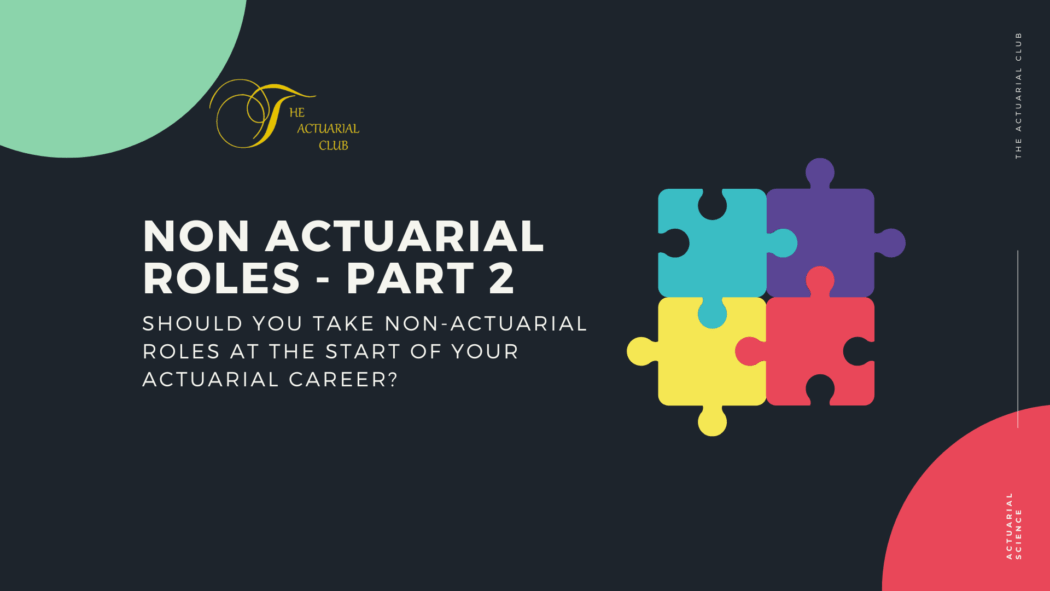In Part 1 of this article, I talked about how to find a non-actuarial role, its advantages and disadvantages. In this article, I would be sharing the ideal timing to switch your non-actuarial roles, my personal experience and some FAQ’s. If you have not read Should you take non-actuarial roles at the start of your actuarial career? – Part 1, I highly encourage to read that first before reading this.
What it the ideal time to leave your non-actuarial role?
No one can tell you the exact time, only you can tell for yourself. Interpret this section as a recommended time, but not an exact approach. The ideal time to switch would depend on 3 things:
- How much is it related to actuarial? (e.g., Finance, risk, accounts, investments, banking, data analyst, etc.)
- How interesting is it? (e.g., Culture, workplace, etc.)
- Your personal interest
Regardless of the above 3 factors, I highly encourage you to stay for at least 1-2 months, before start looking for an actuarial role because you would still learn a lot. In worst case, work for 1-2 months, and then leave and then continue looking for an actuarial role.
As per survey on LinkedIn, 66% people suggested to work for 0.5-1.5 years before switching but as per 15 interviews conducted by me, one should ideally start to search after:
- 3-5 months – If job not related to actuarial
- 5-7 months – If job is related to actuarial
It might take around 3+ months or even more to find an ideal actuarial role. So you don’t want to start looking after an year and get a freshers job after 3 months because no matter how long you work 3 months or 1.5 years, you would be mostly considered as fresher and after working for 1-1.5 years and then getting a fresher role could be little demotivating. And remember, companies don’t prefer candidates who has worked to long in a non-actuarial role.
Starting job search early would also help you to apply for more job openings >> more interviews >> better opportunities. You might also want to work in a particular area eg. General Insurance, and thus starting the job search early could help you to get into your desire profile.
My Personal Experience
During my summer vacations in second year of my college, I took an internship at Mahindra Finance sale department where I was responsible to call brokers & sales team and motivate them to sell Mahindra FD. I used to call around 150 people daily and manged to achieve twice the success ratio than normal. This internship completely changed the way I communicate and interact with people across all mediums be it written or spoken.
After the internship, all the articles which I have ever written crossed more than 15,000 readers each and all are currently shows on top 5 google searches in the world (some of them even appears as the first link). And till date among all the people whom I have worked always recognised me as person with strong communication skills. Those 40 days really helped me in a way that I have never expected. It might be same for you!

FAQ’s
What should I do, if I get an actuarial job just after I joined my non-actuarial roles?
Most jobs have a probation period, during which you can leave the company anytime without serving any notice period. If in case, there is no probation period then also you can leave but you won’t get any salary and/or your experience certificate and/or in worst cases you would be blacklisted, meaning you won’t be able to join that company again in the future. In most cases, things do not get so extreme.
Is internal rotation possible? If yes, how does internal rotation works?
Yes, it is a possibility, and it would mostly depend on your rapport with your current manager and whether he/she allows you to switch or not. I recommend you build a rapport first for 1-3 months and then asking if it possible to allow you to switch teams.
Please note that many big companies have subsidiaries or have clauses that would make internal rotation not possible and most companies do not share this before hiring. So, it is also that you will not have an option to switch at all.
I am working in a non-actuarial role, and I got an actuarial INTERNSHIP opportunity. Should I switch my role?
There is no one answer to this question and ultimately would depend on your personal choice. It would depend on how good the overall internship role is? Is the internship in your ideal domain which you want to work? Is there a chance for full time opportunity after the internship? How long have you been working in your non-actuarial role? And mostly How desperate you are to work in a actuarial profile. Again, there is no one answer to it, but asking these questions would help you gain lot of clarity and help you in your decision-making process. You can also reach out to me on LinkedIn for any specific help.
Is it recommended to take a non-actuarial internship during my graduation?
Absolutely yes
Conclusion
I completely understand that when you actually start looking for a role, it could be very hard to even think about pursuing a non-actuarial role. After all, why you should pursue it after dedicating months to clear exams, sacrificing a lot of things and spending a good sum of money. But the truth is the market is filled with smart actuarial people and there are at least 400 applications for a single actuarial job opening and all of them have cleared actuarial papers and knows about different software. There is only a 0.25% chance that you would be selected. And a truth for most people it takes an average of more than 3 months to get an actuarial role.
So, why not utilise this time to learn and increase your chances of success. Most people, won’t take this path and that’s why if you took it, it would help you outshine yourself than others. I talked to 15 people who have taken this path and 100% of them suggested that all freshers should take this path.
I recommend that when you start searching for jobs apply for all kinds of jobs i.e. actuarial jobs, actuarial related roles and non-actuarial related roles. It can be hard, but I can assure you do if you do it properly (taking care of all the potential disadvantages mentioned in Part 1 of this article), you won’t regret it. Hope you enjoy reading it.


